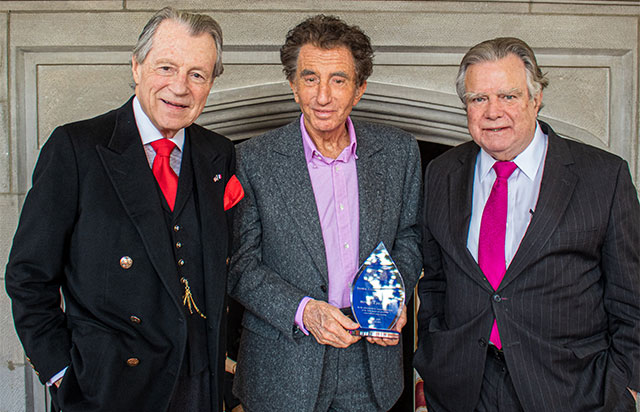Lang Recognized for Promoting Cross-Cultural Understanding at the Institut du Monde Arabe
Washington, D.C.: On January 24, 2020, the National Council on U.S.-Arab Relations (“National Council”) was honored and privileged to present its first-ever GLOBAL CULTURAL LEADERSHIP AWARD to Monsieur Dr. Jack Lang, President of the Institut du Monde Arabe (IMA) in Paris, France. The Award was bestowed in recognition of Monsieur Lang’s achievements in expanding knowledge of the Arab region and promoting cross-cultural understanding.
National Council Founding President and CEO Dr. John Duke Anthony, Council Board Chairman Mr. John Pratt, Council International Advisory Board Member Mr. Leo A. Daly III, and Council Executive Vice President Mr. Patrick Mancino personally presented the award to Monsieur Lang at the French ambassador’s residence in Washington, D.C. Mr. Lang and a delegation from the IMA were in Washington to celebrate the opening of the IMA exhibition Age Old Cities: A Virtual Journey from Palmyra to Mosul at the Smithsonian’s National Museum of Asian Art.
In conveying the award, Dr. John Duke Anthony remarked that, “What Monsieur Lang and the IMA have achieved in highlighting the rich history and culture of the Arab region is considerable. They have done much to showcase Arab contributions to knowledge and understanding that have benefited the world’s civilizations and humankind in general. Under Monsieur Lang’s leadership, the IMA has effectively pushed into new territories in storytelling and technology that help further illuminate the innumerable, extraordinary, and myriad impacts that Arabs have had on humanity’s endless quest for modernization and development.”

Monsieur Lang was appointed to serve as President of the IMA by French President François Hollande in 2013. Monsieur Lang previously served as France’s Minister of Culture (1981-1986 and 1988-1993) and Minister of Education (1992-1993 and 2000-2002), as a National Assembly member for over two decades, as Mayor of Blois, and as a Special Advisor to the UN Secretary General Ban Ki-Moon.
The IMA in Paris, France, was inaugurated in 1987 as a center dedicated to promoting Arab civilization, knowledge, and art. Located along the Seine River and adorned with photosensitive mashrabiyas on its façade, the IMA has developed unique collections and special exhibitions that have been featured in the Paris institute and at leading museums around the world. The IMA’s Paris exhibition of AlUla: Wonder of Arabia, which showcases Saudi Arabia’s Nabataean archeological marvel, was recently given an extension of its scheduled availability based on extraordinary public interest. Dr. John Duke Anthony and the National Council have long admired the IMA and are presently working to develop an Arab Cultural Institute in Washington, D.C.
About the National Council on U.S.-Arab Relations: Founded in 1983 and based in Washington, D.C., the National Council is an American non-profit, non-governmental, educational organization. The Council pursues its educational mission through nine programs, projects, events, and activities. Each is dedicated to enhancing American awareness and appreciation of the extraordinary benefits that the United States has long derived from its special relationships with countries in the Arab region – and vice versa.
At the center of the National Council’s efforts to advance American knowledge and understanding of Arab culture, societal dynamics, and systems of governance are the Council’s flagship education, training, and leadership development programs. These are designed to elevate the leadership skills and empirical Arab-centric educational experiences of the emerging generation of young Americans and Arabs. Upon their shoulders will rest the responsibility for ensuring that the relationships between the American and Arab peoples are continuously strengthened, improved, and sustained far into the future.
Information about the Council can be found at ncusar.org.
